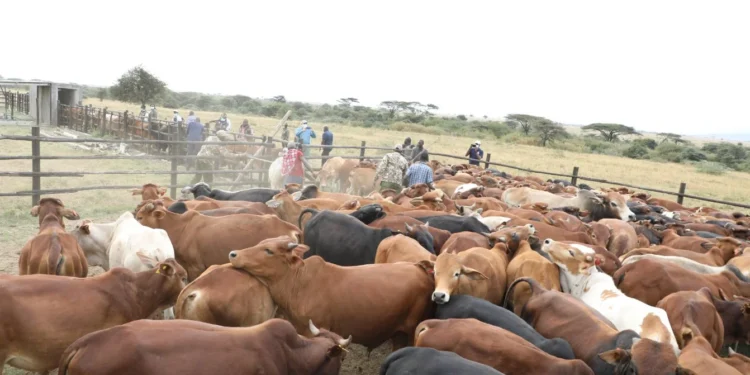- KVA urges the government to prioritize public awareness regarding livestock vaccinations following the nation-wide resistance spread.
- The Kenya Veterinary Association has warned against politicization of the livestock vaccination initiative.
- Kenya plans to vaccinate 22 million cattle, 50 million goats, and sheep from January 2025.
The Kenya Veterinary Association (KVA) breaks silence on the heated debate over the forced livestock vaccination on Kenyans by the government. KVA is urging the government to prioritize public participation, engaging various stakeholders in the livestock sector to avert uproar from Kenyans, who have since lost confidence in the government.
The KVA, however, said that it reached out to the government on the basis and specifics of the vaccination campaign but were met with the assuarance that control of greenhouse gas emissions is not a priority, that the methane redcuing vaccine is inaccessible at the moment, and that the Kenya Veterinary Vaccines Production Institute (KEVEVAPI) has the capacity to produce the required number of vaccines to ensure the success of the program.
These are some of the critical issues concerned Kenyans have been against since the president announced the planned nationwide vaccination, set to begin in January 2025.
The Kenya Veterinary Association has reminded the government of the recent abrasive statements emanating from politicians and corruption seen in service delivery to the public, especially in the agricultural sector, including the much-peddeled lies that have eroded the initial trust people had in it.
“This administration’s actions since it came to power have eroded any sense of public trust that Kenyans had with government institutions, making it hard for them to trust such government initiatives. From supplying its one farmers with fake fertilizer to so many lies told as promises. It’s hard to blame Kenyans when they see conspiracies in such programs.”
“The government needs to realize that these lies can only go so far before jeopardizing public health and secince, among other critical issues whose success is heavily reliant on public trust.”
Additionally, KVA asserted that the government’s failure to conduct adequate public sensitization has led to widespread resistance among livestock keepers and the general public.
“The government’s failure to conduct adequate public sensitization has fueled widespread resistance and misinformation among livestock keepers and the general public. This situation not only hampers disease control but also risks creating further outbreaks. Stakeholders. Including farmers, veterinary professionals, and community leaders, were not sufficiently involved in planning, leading to mistrust and confusion, including in professional circles.”
Poor implementation by the county governments in ensuring that veterinary departements are well resourced, exacerbating efforts to control diseases such as Food-and-Mouth Disease and Peste des petits Ruminants (PPR), which hinders international trade.
“Counties have poorly resourced veterinary departments, leading to inconsistent implementation of national strategies such as the Kenya PPR and FMD control strategies. This fragmentation undermines the effectiveness of disease control efforts, leaving the livestock population vulnerable and threatening national and regional security.”
While urging the government to engage stakeholders, including the veterinary professionals, farmers, and local leaders, the KVA also implored politicians to refrain from politicizing the exercise, leading to the spread of propaganda.
Githinguri member of parliament, Hon. Gathoni Wa Muchomba, is among the hardest critics of the exercise, terming it a global depopulation agenda. She advised Kenyans to reject the panned livestock vaccination. Narok Senator Ledama Ole Kina has stood his ground that his cows will not be vaccinated, despite being close to the regime.
In the context of defending the vaccination program against claims that it was linked to foreign agender, President Ruto strongly and aggressively described those opposed to the livestock vaccination initiative as “stupid” and “mad,” suggesting that they were “possessed by evil spirits.”
Kenya plans to vaccinate 22 million cattle and 50 million goats and sheep, set to begin in January 2025.







